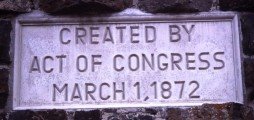What is to be protected?

.. Too often verbal discourse degenerates into harangue because the topic of discussion is perceived differently by the participants. This is complicated by starting the discourse "in the middle," without a clear statement of bias or perception. This is just preaching to the choir.
.. Today there is much wringing of hands and wailing about the National Park Service and it's mishandling of parks, poor record of protection, and other perceived shortcomings.
.. Seldom is the question asked: "What is to be protected?" Yellowstone National Park was established because of it's geological curiosities, (19th century perception.) Long after it was established the park continued to be hunted for food for the visitors. Certainly no thought was given to preservation of non-geological elements of the park. Hotels and Inns were built willy-nilly, roads diverted streams, trees were utilized for fire and construction. Why? Because none of this "impacted the curiosities."
 .. Each park, as it was added to the system, had it's unique aspects that were to be protected. Some were historic, some biological, some geological, etc.
.. Each park, as it was added to the system, had it's unique aspects that were to be protected. Some were historic, some biological, some geological, etc... As the National Park Service evolved, it incorporated values from each park into it's overriding management mandate. Soon the NPS was promulgating rules for all parks that were initiated in single and unique parks. It was easy to do it this way.
.. And then,without ever bothering to define what was being protected, everything was protected. This has come to be the modern perception of a park. Protect it all, unique or otherwise. The perception that a park is a wilderness area is pure fiction. Yet that is the place that most polemicists start their argument.
 .. Some people, today, believe that parks are a good place to feed squirrels. See an article in the St. George Spectrum. Some people, today, believe that parks are a good place to: - etc., add your own bias.
.. Some people, today, believe that parks are a good place to feed squirrels. See an article in the St. George Spectrum. Some people, today, believe that parks are a good place to: - etc., add your own bias... This is both a logical and practical problem. Why is there no hunting in parks with introduced species? Because we are preserving them. Even if they are eating the park to death.
.. Why does Yellowstone National Park protect invasive Brown Trout to the detriment of native Cutthroat Trout? Because we are protecting them. Even if they are out competing the natives.
.. Today there are many people who view the NPS as the one governmental agency that should preserve all things natural and cultural and otherwise within the boundaries of each and every park. Driven by this perception they have heaped an enormous, (and impossible,) burden on the NPS. Of course they are going to fail. The polemics of this mis-perception demand that they fail.
.. It's time for America to decide just what is worth preserving in each park & do it! Once the "ALL THINGS TO ALL PEOPLE" perspective is abandoned the NPS will have a lower failure rate - AND the American Public will be better served.
.. One problem facing the parks has little to do with preservation. Maintenance. The National Parks Conservation Association has detailed the problem very succinctly. This too, needs be addressed from a responsible point of view.
.. The one thing that is constant in all parks is change. The same should be said of the NPS. Parks change, times change, perceptions change. The current wailing and gnashing of teeth by special interests, (such as skiers, backpackers, snowshoers, snowmobilers, etc.,) reflects this change.
..It's time for the polemicists, the American Public, and the NPS to decide just what a park is. We know what it is not! It's not a wilderness area, it's not a National Forest, it's not an arboretum. But, WHAT IS IT?
.. The value of each park is unique. It's perceived value should not be imposed on other parks. The current Bush Plan takes the opposite view. It perceives that all parks can be subsumed into a single perception. It is doomed to failure.
.. The Denver Post editorial of 08/11/2006 provides an excellent commentary on the current state of affairs.
